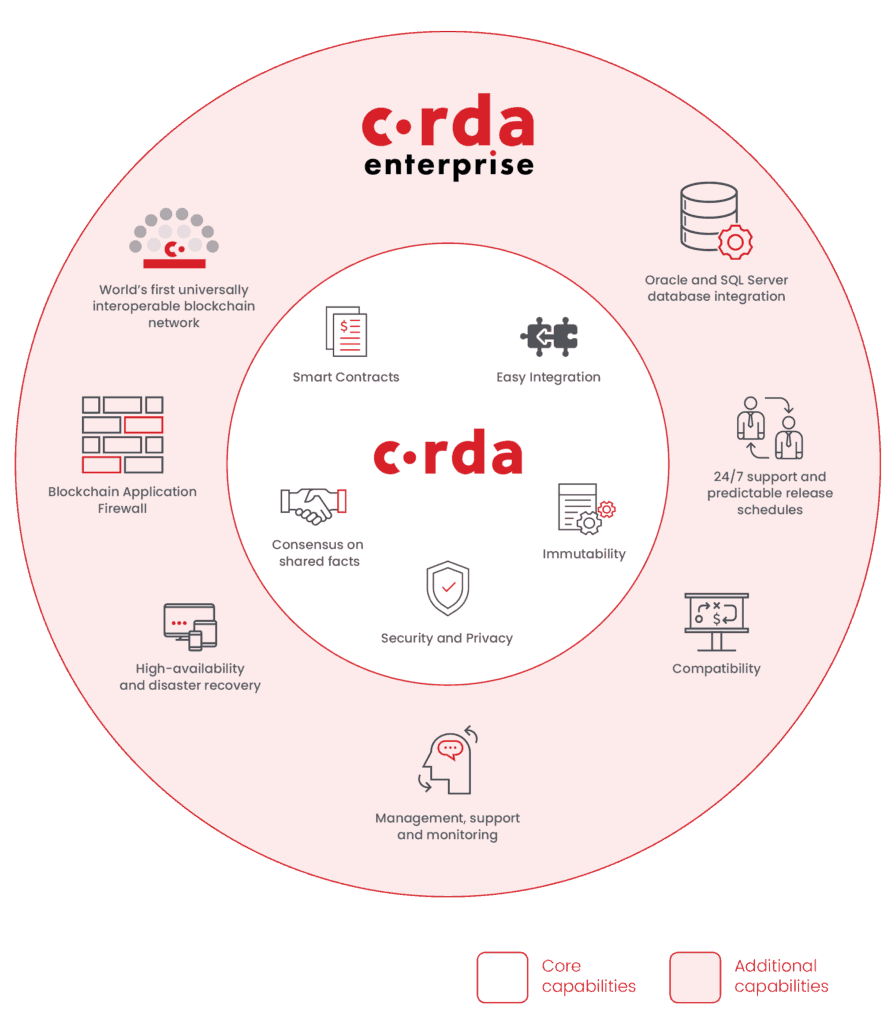R3 is a distributed ledger technology company leading a consortium of more than 200 firms. A vast majority of them gear their activities towards the R&D of distributed ledger usage. The company aims at disrupting the financial system and other areas of commerce.
Experienced creative professional focusing on fintech analysis, cryptocurrency ecosystem and blockchain space. Teuta thinks that without blockchain – everything would seem like one endless Groundhog Day. One of her greatest role models whom she looks up to is Don Tapscott… but also Bruce Dickinson from Iron Maiden.
R3 has is headquarters in NYC and was founded in 2014 by David E Rutter; the current CTO is Richard G Brown.

R3 Founder & CEO

R3 CTO
The Corda platform
The consortium’s partnership created an open-source distributed ledger platform named Corda. It is specifically regulated towards the financial world as it handles complex transactions and restricts access to transaction data.
Corda’s ambition is to provide a platform ensuring that any services built on top are compatible among the network participants. It has attracted the interest from several industries such as insurance companies, hospitals, government associations and also energy suppliers.

Real world companies using R3’s Corda
Corda is inspired by blockchain databases and is expected to have many of blockchains’ benefits; nevertheless, it is difficult to fully call it a Blockchain per se. It does, however, nurture innovation and faster time to market.
“Corda removes high costs that are usually prevailing in business transactions by enabling businesses to transact directly”
So What is Corda?
Corda is actually a blockchain inspired, open-sourced distributed ledger platform. As a plethora of financial services companies showed interest during its first stage, a financial service consortium was then created.
Potential solutions Corda wants to offer are related to data reconciliation.
Millions of dollars are spent every year to reconcile data. Corda introduces a short processing logic to meet organizational, financial synchronization and reconciliation.
Corda removes high costs that are usually prevailing in business transactions by enabling businesses to transact directly. With smart contracts and blockchain technology, Corda allows existing business networks to reduce transactions’ costs. Indirectly, it reduces the costs of keeping a record of transactions as well.

Interactions with transparency and privacy
Corda enables an open network. This network is used to empower different companies and organizations. It allows them to cooperate and transfer their value directly with trust. Corda achieves this with complete privacy and transparency.
The platform is designed to allow interacting parties to make sure they are thoroughly leveled. Corda removes the necessity for all parties on its network to know about each and every transaction. Indeed, only those involved have access to their information.
When a bank, for instance, transfers money from a client’s account to the receiver’s account, both banks must check that the transaction was credible. It means that the funds from the client must be sent and received in a legitimate way. It needs to ensure that the quantity of the funds has decreased in one account and has increased in the other. This process requires multiple checks from both sides of the transaction. Furthermore, a number of these checks are done manually, requiring even more time and effort to ensure consistency.
DLT & Reconcicliation
A Distributed Ledger completely removes the need for this reconciliation whether it is done by the interacting parties themselves or someone else. This is due to the nature of Distributed Ledgers where all nodes (the parties) must be in the same state. Specifically to Corda, a transaction is only committed when all involved parties have accepted that the inputs/outputs of the transaction are correct. If anyone disagrees, then, it doesn’t take place. Otherwise, the transaction is committed and the funds (or any other inputs/outputs) are moved between the parties as previously agreed.

Is Corda Trustworthy?
Even though Corda is not a blockchain platform, it doesn’t mean you can not trust Corda. One of it’s a rule is that a party’s identity must be identified prior to joining an existing Corda network. Parties on the network must trust the assets’ issuers onto the ledger that they themselves are moving around within transactions. However, it is not necessary for parties to trust each other. All identities are known and admitted by the networks certificate authority. Hence, it provides a certain backup guarantee in case of any misconduct.
One of Corda’s defining features is Corda Network; it is a prime network that provides a simple layer of identity and consensus across business networks. It allows both data and digitized assets to move frictionless on an open network protected by Corda’s privacy model. In that way, companies can transact smoothly both with their own business lines and with their partners.
Corda Network is a governed by a not-for-profit foundation, set up and domiciled in Holland. Corda Network participants are eligible to vote and stand for the Foundation’s Board which make key decisions. It includes network standards and parameters, policies, as well as membership for Corda Network.
So What’s Next?
R3 Lead platform engineer
Recently, we had an opportunity to witness more and more blockchain companies switching to Corda (rather than Hyperledger, for instance). SWIFT made an important announcement regarding its integration of R3’s blockchain-based trade finance platform. Together with R3, SWIFT develops a proof-of-concept to link R3 Corda Platform to SWIFT’s GPI payments framework.
Disruption seems to has finally arrived…
Nevertheless, a R3’s lead platform engineer’s response regarding banks’ commitment is quite frustrating.
Mike Hears, the platform engineer, wrote:
“I’ll be brutally honest – right now big banks are ‘really committed’ to nothing at all. Banks handle the world economy. If that breaks, then the economy falls over and we all die. That means the bar is high: at the moment there aren’t any platforms that are 100% convincing for a production deployment across all banks. Corda too because it’s not finished yet.”















